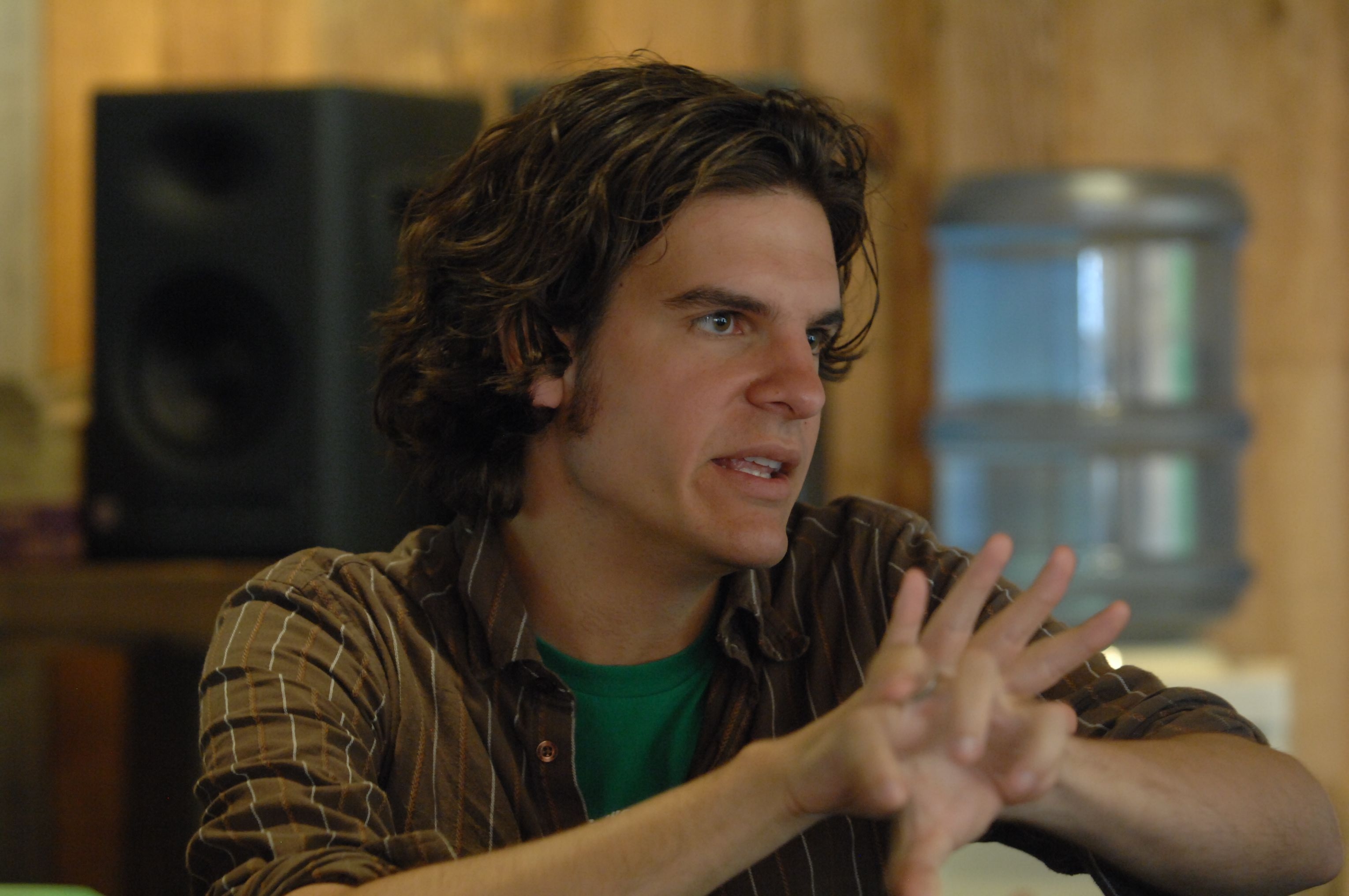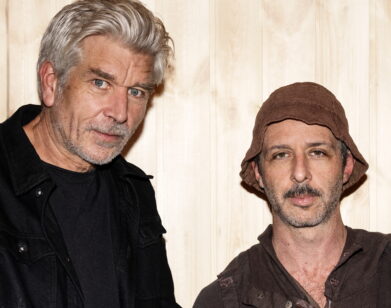Alex Timbers’ Labour Party

ABOVE: ALEX TIMBERS
At age 34, Alex Timbers has already directed three plays on Broadway, with another one slated to open in early 2014. The young director’s plays have collectively garnered 11 Tony Award nominations, and he has collaborated with everyone from Pee-wee Herman to David Byrne to Kermit the Frog.
What makes Alex Timbers unique is his singular vision and outspoken mission to integrate contemporary popular culture elements into the theater. Timbers, who comes from a downtown, experimental theater background, has made his name directing plays that challenge audiences by injecting humor into unlikely situations and providing visceral theatrical experiences.
Amongst Timbers’ distinguishing directorial works are the self-authored Bloody Bloody Andrew Jackson, a historical rock musical starring the seventh president as an emo punk rocker, Here Lies Love, an interactive discothèque experience in collaboration with musician David Byrne that explores the controversial rule of Filipina political figure Imelda Marcos, and the Tony award-winning Peter and the Starcatcher, which, adapted from the children’s book of the same name, tells the origin story of Peter Pan.
Other out-of-the-box projects include The Pee-wee Herman Show, a live stage show version of the quirky 1990s TV show, and a test workshop for a possible Broadway-bound, puppet-led Muppet stage musical.
Timbers’ latest directorial project is The Public Theater’s free Shakespeare in the Park production of Love’s Labour’s Lost, which will be performed in Central Park through August 18. As you might expect, Timbers has an unconventional approach to Shakespeare. This new version of Love’s Labour’s Lost is a modern musical, with music and lyrics written by Timbers’s Bloody Bloody Andrew Jackson collaborator Michael Friedman, which combines Shakespeare’s text with contemporary music sung in modern parlance.
Set at a five-year college reunion, Shakespeare’s princes and princesses have been transformed into Ivy League graduates, oscillating wildly between contemplative adulthood and 20-something party mode. The reinterpretation is a comedic romp through the frivolousness and insecurities of youth, complete with ’90s love ballads, sequined booty shorts, and German Kraftwerk-esque performance art.
This reimagining of Shakespeare is just the first in a line of new projects for Timbers that includes an upcoming production of The Last Goodbye, which combines the classic love story of Romeo & Juliet with Jeff Buckley’s music and the 2014 Broadway musical Rocky, based on the 1976 Sylvester Stallone boxing film. Timbers spoke to Interview about what defines his broad body of work, the films, plays, and ideas that inspired Love’s Labour’s Lost, and why as a student of theater and fan of pop culture he loves a good mash-up.
LAURIE KAMENS: How did the musical adaptation of Love Labour’s Lost originally come about?
ALEX TIMBERS: It was a meaningful thing for me in college to work on a production of Two Gentlemen of Verona the musical, which was in the park 42 years ago. Michael [Friedman] and I had just been doing BBAJ, which was just about to move to Broadway, and I sort of came up with the idea talking to Oskar [Eustis, Artistic Director of the Public Theater] about what if we did our kind of musical version of a Shakespeare play in the spirit of Two Gentlemen of Verona.
Oskar sparked to that kind of quickly, and we started looking at plays. I’ve acted in very few plays, but in college I acted in Love’s Labour’s Lost, [which] is about coming of age—it’s about deciding to engage with the world or not, what it means to be an adult, what is learning, what is growing up, what is loving, and what are the true kinds of love versus superficial kinds of love. What I found really attractive about the idea was that it felt so different from Bloody Bloody Andrew Jackson in that it’s a romantic comedy; it’s about huge, sincere, earnest displays of affection and emotion. It felt like an exciting change of place.
KAMENS: Was it difficult to adapt the play into a musical?
TIMBERS: No, it actually lent itself really quite easily, because the boys show up already writing these sonnets and speaking in elaborate poetic terms. I always find when you’re dealing with an adaptation there are certain things where it feels like it really resists musicalization, [but] Love’s Labour’s Lost really doesn’t bump up against those questions in an uneasy way.
KAMESN: How close is this version to the original Shakespearean text?
TIMBERS: The book adaptation I’ve done is basically all Shakespeare. And Michael [Friedman], with the lyrics, has taken a mix of Shakespeare and his own creation. We’ve been left with about an hour of text, so we’ve had to make some really big decisions about what kind of characters to foreground, what type of comedy fits in the world, what kinds of relationships are we’re more attracted to than others. I kind of feel like it was a sort of J.J. Abrams treatment in our approach to the material, inasmuch as we’re huge fans of the play, and as fans, what characters do we feel are unexplored that we could do more of the backstory [on]: Wouldn’t it be really cool if this character met this other person and was able so sing a song—so it’s that sort of thing of what relationships and characters and views are we pushing for and which ones naturally recede during the cutting process.
KAMENS: What kind of challenges, if any, did you encounter with this play?
TIMBERS: The play is really known for ornateness and sort of the esoteric nature of the intellectual and linguistic references. We’ve gone through with a fine-tooth comb and tried to figure out what we could keep that will resonate [with] an audience of non-academics. [For] people who are not well versed with the play, what is going to be really relatable?
KAMENS: What does adding rock-‘n’-roll music bring to a classical text like Shakespeare?
TIMBERS: We had this idea that we wanted to set the show at a five-year college reunion, because I was thinking who are kings and princesses today and they’re sort of privileged kids that go to Brown University or Wesleyan, or other schools like that, and to set the show at that moment in your mid-20s when you feel that urge to grow up but sort of feel that sense of you have no idea how to do that, that was something that I wanted to capture. I love movies like Noah Baumbach‘s Kicking and Screaming, and that’s kind of the approach to the adaptation of this. We thought it was important that the show not feel like some sort of museum piece, and because it’s set today, have some of the sound and music of today.
KAMENS: In the past you’ve expressed an interest in “aggressive, visceral theater,” whether it’s a political piece like Bloody Bloody Andrew Jackson or an interactive audience experience like Here Lies Love. How does this play fit in to this model?
TIMBERS: In Love’s Labour’s Lost, there’s a lot of direct declaration of these big emotions, and so there’s a bit of crossing direct address in Love’s Labour’s Lost, and I really love that. I don’t love as much theater that exists in some sort of slightly hermetic world within four walls that we’re peering into. I like theater that acknowledges the audience is present… I would say that this show is visceral in that when we see it there is a lot of intimacy and spectacle and everything in between. Is it aggressive or violent work? I don’t think so, I think it’s a very sweet, loving show.
KAMENS: Many of your plays tend to also be comedic. I was surprised to learn that in college you were part of an improv comedy troupe. How does your background in comedy influence your directorial style?
TIMBERS: It’s a huge influence. Just the way I create pieces is through a lot of workshops and readings with really funny actors. I think the building of the show and the cutting that has to do with me sitting alone in a room, as much as being in a room with these really funny actors as they ad lib or suggest new music. A moment can make itself in the room, as opposed to treating the script you go into rehearsal with as the final draft. It has to do so much with the kind of actors you cast; people who are really funny and also don’t send up their characters and are true to the humanity of them. So all these shows are as much a product of mine and Michael’s as they are of the actors who work on them.
KAMENS: Your body of work is extremely diverse—from historical mash-ups like Bloody Bloody Andrew Jackson to adaptations of popular culture pieces like The Pee Wee Herman Show and the upcoming Broadway musical production of Rocky. What do you look for in a project?
TIMBERS: I was thinking the other day about what unifies these shows. I find connections between the work, but I think the overarching thing that I’m really interested in is when the kind of experiences that the protagonists are going through are things I’ve experienced in my life. You don’t see me directing a lot of shows with protagonists that are older than me, because I don’t always know how to relate to those life experiences. I hadn’t really realized that until this year, and that a lot of shows I do are about people in their 20s or 30s or teenagers, and a lot of the questions are about growing up, engaging with the world. I think Love’s Labour’s Lost has this great question of how do you put yourself out there? How do you love without shame? I see a lot of these bigger questions in Bloody Bloody Andrew Jackson, Rocky, and obviously Romeo and Juliet. I definitely know pretty quickly. I sort of work in waves, and I can tell you from the shows I’m working on now which ones I took on two years ago, which ones I took on six years ago, and just as I’m getting older and changing and valuing different things, those are too. I think the work I’m doing now is more emotional—visibly emotional—than the work I was doing a couple of years ago. That’s what’s interesting me.
LOVE’S LABOUR’S LOST PLAYS AT CENTRAL PARK’S DELACORTE THEATER THROUGH AUGUST 18. FOR MORE INFORMATION, VISIT SHAKESPEARE IN THE PARK’S WEBSITE.






